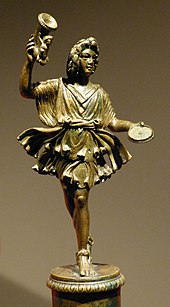Lares
![]()
This article is about the Roman patron gods, for other meanings see Laren (disambiguation).
![]()
This article on Roman mythology is still missing the following important information:
- Evidence for source(s) of the myth
Delete the list item in question when it is done. For explanations of the individual items, see here.
Help Wikipedia by researching and adding them.
The Lares (Latin Lares; singular Lar) are the patron gods or guardian spirits of certain places and families in Roman religion.
The Lares Familiares, together with the Penates, were the guardian spirits of the family and symbolized the household. They were equated with the deified souls of the deceased ancestors. They were worshipped at all family festivals and accompanied the family when it moved away. The cult probably goes back to primeval house burials. The comedy poet Plautus lets himself characterize a Laren as follows: "I am the Lar familiaris of the house from which you have seen me step. This house I have owned and cherished for many years, already for the father and grandfather of him who now inhabits it." He goes on to say that he is revered by the daughter of the house and receives daily offerings from her.
The Lares Loci, on the other hand, were the guardian spirits of a particular place. In the Lararium, the Lares Loci of the place where a house had been built were represented and worshipped by one or more serpents. Lares Loci were stationary, meaning that they did not move with the inhabitants of a house.
Lares Publici were the guardian spirits of entire villages. In central Italy they were also called Lares Compitales in the towns and Lares Paganales in the villages. Lares were also guardian spirits of public places and crossroads, which, according to common belief, were not without danger. In ancient Rome there was a shrine dedicated to them at every crossroads. This task was taken over by the so-called crossroads associations.
Lares were male and very procreative. Their female partners were the Virae. The worship of the Lares and Penates was forbidden on November 8, 392.
The Lar is the title of an 1889 novel by Wilhelm Raabe, and Rainer Maria Rilke published a volume of poetry, Larenopfer, in 1895.

Dancing Lar (Bronze, 1st century)
_01.jpg)
Lar (bronze, 1st century)
Search within the encyclopedia